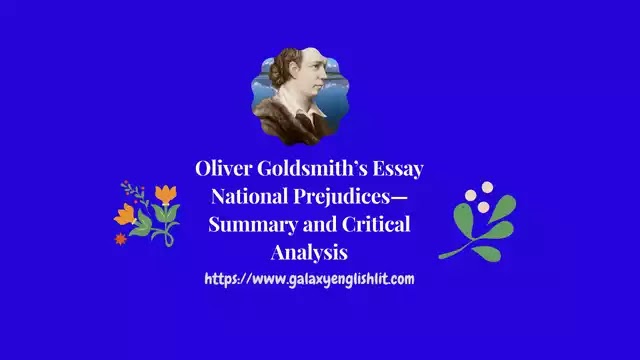Introduction of the Poem:
The poem “Church Going” appeared in Larkin's second volume The Less Deceived. The poem was written in 1954. It was a time when attendance in churches had begun to decline. It affirms the poet as an agonistic. This poem talks about importance of institution of religion in human culture. The narrator is apparently a non-believer who, in spite of his non believing nature accepts the importance of things like church in human life.
 |
| Poem Church Going: Summary and Critical Appreciation |
At the beginning of 1950, less than ten percent of population was church goers. As the church seems to lose its importance, there are fears that its place in modern society would become insignificant. In the poem, the poet discusses futility and utility of going to a church. The discussion is half - mockery and half serious. The poem is a monologue in which the speaker scoffs at the church and its equipment. He scoffs at the church going, though at the end of the poem he finds that at least some of the churches will continue to render some service to the people even after they have ceased to be places of worship.
Summary of the Poem:
The speaker begins by telling about his habit of visiting churches. But strangely he visits a church when there is no ceremony going on there. In fact he visits a church when there is nobody inside. He goes inside a church and looks at the floor, the seats and the number of Bibles there. He examines the organ and touches the font. He moves forward and reads a few verses from the Bible. Then he goes to the entrance. There he signs the visitor's book and donates a six pence coin. Then he comes back. Every time he visits a church and feels that he has wasted his time in visiting a church, where nothing worthwhile is there to see . But he cannot overcome his habit. The speaker often wonders as to what would happen to church buildings when people finally decide not to visit them. He thinks that some of the churches might be turned into museums. The equipment used in churches would be displayed in locked glass cases. Few other buildings of churches would be abandoned and exposed to the weather. Rain would fall freely upon them and the herd of sheep would often come to graze. Moreover, it may also be possible that people start avoiding these church buildings, considering them as unlucky places. Then he thinks of another possibility. Some superstitious women might visit the ruined church buildings to get a cure for their sick children. They might find a herb or touch a stone or some other holy spot. Some others might visit a churchyard hoping to see the spirit of a dead relative that lies buried there. Eventually like faith, superstitions would also die. The church buildings would finally be completely abandoned, overgrown with grass, weeds and thorny plants. People would not even recognise them as churches of old. The speaker then makes a guess as to who would be the last person to visit a church for religious or spiritual purpose. It might be a person who had been in the habit of visiting a church at Christmas and now wanted to recall the original atmosphere of a church. It is also possible that the last person to visit church would be one like the speaker himself.
Finally, the speaker feels that a church is a serious place. It would never wholly go out of use, even when people have lost their faith in God and in all religious beliefs and rituals. Someone or the other would have a compelling desire to visit a church, even a ruined church, because in every age people would remember having heard that a church was a simple place where one could become wise. Indeed those people would think that a visit to the church could make a man wise.
Critical Appreciation of the Poem:
Introduction:
“Church Going” is a representative poem of Larkin. It is contained in the volume of the poems entitled The Less Deceived. It is an autobiographical poem. In this poem, Larkin discusses the futility and the utility of going to a Church. The speaker frankly appears as agnostic. This poem provides the image of an ordinary English man who is not very much concerned about religion or Church worship. The poem also shows that the importance of the Church is gradually decreasing day - by - day. This poem represents a highly serious attempt by a reverent agnostic to express and come to terms with a feeling about religion, particularly about Christianity.
Development of Thoughts:
In this poem Larkin gives the description of his visit to a Church. He goes into a Church building after making sure that no ceremony or ritual is being performed at that time. In the beginning of the poem he observes the matting on the floor, the seats, and a number of Bibles. He also sees flowers which had been placed inside the Church on Sunday last. The flowers are now faded. He also observes the small organic placed on the one table of the Church. This is a piano - like instrument which produces music to the accompaniment to the song. Then he mounts the lectern and goes through a few verses of the Bible. After reading he loudly says that the verses have been perused by him. The song and the verses are so loudly spoken by him that the echo of those words are heard by him. As if someone else is mocking at him. Then he goes back to the entrance of the Church.
Then he drops six pence coins and comes out. Then he feels that it was not worthwhile for him to stop on his way to enter the Church.
Then the poet begins to think on the future of the Church as it will play its role to coming generations, the poet finds the Church - going as a promotor of the welfare of mankind but he also thinks that the Churches have no value in modern times. He begins to wonder what purpose the Churches will serve when they fall into disuse. He feels that some Cathedrals will be maintained as rare representative of Churches:
“When churches fall completely out of use
What we shall turn them into, if we shall keep
A few cathedrals chronically on show,
Their parchment, plate and pyx in locked cases,
And let the rest rent - free to rain and sheep.
Shall we avoid them as unlucky places?”
In the fourth stanza, Larkin, the speaker continues the visitors speculations about the role of women in Church Going. Women with questionable characters may come to the Church to bring their children to touch a particular stone. This tendency results in superstitions or blind rituals. This idea has been explained by the poet in the following fourth stanza.
Larkin believes that sooner or later the Churches will fall into ruins. They will be full of grass, weedy pavements and bushes will grow inside the campus. People will not be able to recognize that a Church existed at that place:
“A shape less recognizable each week,
A purpose more obscure. I wonder who
Will be the last, the very last, to seek
This place for what it was; one of the crew.”
Larkin is so hopeless about the future of the Churches that he thinks that there will be very few persons to attend Churches in future. The people who will come at the end of Churches will be some genuine worshipper or some antiquarian. The poet believes that in future the Churches will become deserted places:
“I wonder who
Will be the last, the very last, to seek
This place for what it was; one of the crew
That tap and jot and know what rood - lofts were?
Some ruin - bibber, randy for antique,
Or Christmas - addict, counting on a whiff
Of gown - and - bands and organ - pipes and myrrh?
Or will he be my representative.”
In the final stanza of Church Going the poet completely changes his view about the Church. He feels that a Church is a serious house situated on this thoughtful earth and in its atmosphere are combined all those human urges which inspired people to attend Church services. Men look upon a Church as a place which decides their fortunes and destinies. This belief of the people will never disappear. In other words, Churches have spiritual significance which will never be ignored by its devotees. Even a ruined Church will attract people to it. People will always think that Church is the place which makes them wise:
“A serious house on serious earth it is,
In whose blent air all our compulsions meet,
Are recognized, and robed as destinies.
And that much never can be obsolete,
Since someone will forever be surprising
A hunger in himself to be more serious,
And gravitating with it to this ground,
Which, he once heard, was proper to grow wise in,
If only that so many dead lie round.”
Ironical Spirit of the Poem:
The spirit of the poem throughout is ironical. The poet while pointing out the dislike of various items in the Church says:
“The echoes snigger briefly. Back at the door
I sign the book, donate an Irish six pence,
Reflect the place was not worth stopping for.
Yet stop I did: in fact I often do.”
At the end of the poem the speaker begins to speculate on the identity of the last visitor to the Church. In his imagination the poet speculates that the last person will surely come to the Church for his spiritual edification. The last stanza is not purely ironical; it expresses the poet's view that the last visitors to the ruined Churches will be those persons who will come there for wisdom and enlightenment.
Half - mocking and Half - serious Manner:
The poet discusses futility and utility of Church Going in half - mocking and half in serious manner. The speaker scoffs at the Church and its equipment. He scoffs at Church going, though at the end of the poem he finds that the Churches, or at least some of them, would continue to render some service to the people even after they have ceased to be places of worship.
Thoroughly Depreciating Manner:
When the speaker enters the Church he looks at various updates of worship such as the speaker stand, the Bible, the piano and other articles. But he speaks off these objects of the Church in a depreciating manner. His depreciation is proved by the following lines:
“Some ruin - bibber, randy for antique,
Or Christmas - addict, counting on a whiff
Of gown - and - bands and organ - pipes and myrrh?
Or will be my representative.”
Form of the Poem:
Church Going is a monologue in which the speaker frankly appears as an agnostic if not as a downright atheist. This monologue has traditional iambic structure and a lucid rational argument. Every stanza contains nine lines and it is written in blank verse. There is no rhyming scheme in the stanza of the poem. The diction of the poem is quite simple and musical. The first two stanzas are pungently detailed and have a wonderful air of verisimilitude and candour. Except for someone would know: I don't', the lines don't have anything unnecessary, verbose or repetitive. In the middle of the poem, there are the speculations ; the questions or the assertions that power of some sort or other will go on and that the Church will be less recognizable each week, or the effort to imagine 'the very last', to seek its purpose. Like the consciously colourful detail at the close, all this is essentially idle, a fabrication. The poem picks up again as Larkin confronts the Church in discovery and wonder : "A serious house on serious earth it is, In whose blent air all our compulsions meet, Are recognized, and robed as destinies ......" An Embodiment of Secular Anglicanism: The poem Church Going embodies what may be called secular Anglicanism which concedes that belief must die but which also insists that the spirit of tradition represented by the English Church cannot die. As the Church seems to loose its importance, there are fears that its place in modern society would become insignificant. The poem Church Going acknowledges those fears and reveals its own specific context by locating this cross of ground at the edge of suburb scrub. Conclusion: Finally it may be concluded that Church Going is one of the best poems of Larkin. The poem is a expression of poet's desire for a welfare state. Religion is not going to play an important role in the poem. This poem presents the image of an ordinary Englishman, not much concerned about religion and Church worship.





